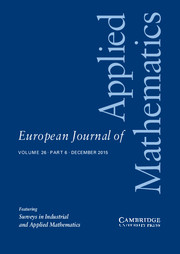Crossref Citations
This article has been cited by the following publications. This list is generated based on data provided by
Crossref.
Taheri, Shahnaz
Tang, Qi
and
Zhang, Kewei
2005.
Young measure solutions and instability of the one-dimensional Perona–Malik equation.
Journal of Mathematical Analysis and Applications,
Vol. 308,
Issue. 2,
p.
467.
Zhang, Kewei
2006.
Existence of infinitely many solutions for the one-dimensional Perona-Malik model.
Calculus of Variations and Partial Differential Equations,
Vol. 26,
Issue. 2,
p.
171.
Esedoglu, Selim
and
Slepčev, Dejan
2008.
Refined upper bounds on the coarsening rate of discrete, ill-posed diffusion equations.
Nonlinearity,
Vol. 21,
Issue. 12,
p.
2759.
Painter, K. J.
2009.
Modelling cell migration strategies in the extracellular matrix.
Journal of Mathematical Biology,
Vol. 58,
Issue. 4-5,
Esedoḡlu, Selim
and
Greer, John B.
2009.
Upper bounds on the coarsening rate of discrete, ill‐posed nonlinear diffusion equations.
Communications on Pure and Applied Mathematics,
Vol. 62,
Issue. 1,
p.
57.
Baker, Ruth E.
Yates, Christian A.
and
Erban, Radek
2010.
From Microscopic to Macroscopic Descriptions of Cell Migration on Growing Domains.
Bulletin of Mathematical Biology,
Vol. 72,
Issue. 3,
p.
719.
Guidotti, Patrick
2012.
A backward–forward regularization of the Perona–Malik equation.
Journal of Differential Equations,
Vol. 252,
Issue. 4,
p.
3226.
Helmers, Michael
and
Herrmann, Michael
2013.
Interface Dynamics in Discrete Forward-Backward Diffusion Equations.
Multiscale Modeling & Simulation,
Vol. 11,
Issue. 4,
p.
1261.
Bao, Lianzhang
and
Zhou, Zhengfang
2014.
Traveling wave in backward and forward parabolic equations from population dynamics.
Discrete & Continuous Dynamical Systems - B,
Vol. 19,
Issue. 6,
p.
1507.
Fedotov, Sergei
and
Korabel, Nickolay
2015.
Self-organized anomalous aggregation of particles performing nonlinear and non-Markovian random walks.
Physical Review E,
Vol. 92,
Issue. 6,
Bao, Lianzhang
and
Huang, Rui
2016.
Interfacial phenomena of the forward backward convection–diffusion equations.
Applied Mathematics Letters,
Vol. 58,
Issue. ,
p.
140.
Helmers, Michael
Niethammer, Barbara
and
Velázquez, Juan J. L.
2016.
Mathematical Analysis of a Coarsening Model with Local Interactions.
Journal of Nonlinear Science,
Vol. 26,
Issue. 5,
p.
1227.
Alonso, Ricardo
Amorim, Paulo
and
Goudon, Thierry
2016.
Analysis of a chemotaxis system modeling ant foraging.
Mathematical Models and Methods in Applied Sciences,
Vol. 26,
Issue. 09,
p.
1785.
Chavy-Waddy, Paul-Christopher
and
Kolokolnikov, Theodore
2016.
A local PDE model of aggregation formation in bacterial colonies.
Nonlinearity,
Vol. 29,
Issue. 10,
p.
3174.
Bao, Lianzhang
and
Zhou, Zhengfang
2017.
Traveling wave solutions for a one dimensional model of cell-to-cell adhesion and diffusion with monostable reaction term.
Discrete & Continuous Dynamical Systems - S,
Vol. 10,
Issue. 3,
p.
395.
Gagneux, Gérard
and
Millet, Olivier
2017.
A model for capillary hysteresis loops in unsaturated porous media theory.
Mathematics and Mechanics of Solids,
Vol. 22,
Issue. 9,
p.
1876.
HILLEN, T.
PAINTER, K. J.
and
WINKLER, M.
2018.
Global solvability and explicit bounds for non-local adhesion models.
European Journal of Applied Mathematics,
Vol. 29,
Issue. 4,
p.
645.
Helmers, Michael
and
Herrmann, Michael
2018.
Hysteresis and Phase Transitions in a Lattice Regularization of an Ill-Posed Forward–Backward Diffusion Equation.
Archive for Rational Mechanics and Analysis,
Vol. 230,
Issue. 1,
p.
231.
Corli, Andrea
and
Malaguti, Luisa
2019.
Viscous profiles in models of collective movement with negative diffusivity.
Zeitschrift für angewandte Mathematik und Physik,
Vol. 70,
Issue. 2,
Bao, Lianzhang
and
Zhou, Zhengfang
2020.
Continuum and lattice models analysis of the aggregation diffusion cell movement.
Journal of Computational and Applied Mathematics,
Vol. 371,
Issue. ,
p.
112682.


